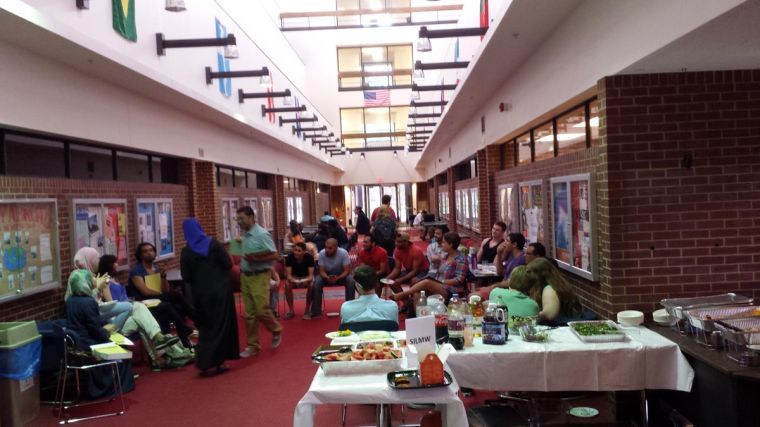Muslim language classes seek to teach language through immersion
Participants in the 6th Summer Institute for the Languages of the Muslim World gather on Thursday, June 19, for a picnic at the Foreign Language Building.
Jun 23, 2014
Last updated on May 11, 2016 at 03:46 a.m.
Noreen Madden is looking to add Arabic to the list of languages she can speak. That’s why she and other students from within and outside the University of Illinois are enrolled in the 6th Summer Institute for the Languages of the Muslim World. This year, the three offered languages are Arabic, Swahili and Turkish.
Madden also speaks Spanish and Moroccan Arabic, which she had the opportunity to put into practice when she studied abroad in Morocco.
She said the Summer Institute for the Languages of the Muslim World is “a cool way to connect with different people and to learn about different cultures.”
“Books only go so far,” Madden said. “With this program we can also learn from each other.”
Get The Daily Illini in your inbox!
The institute is offered within the department of linguistics at the University. The program began June 16 and offers classes in a range of languages including Arabic, Persian, Swahili, Turkish, Urdu and Wolof, depending on the year.
Classes are held for four hours each day, five days a week, over an eight-week period. Those eight weeks are equivalent to an entire academic year of instruction in the language.
Because the courses are open to people outside the University, there are a few students from other institutions who have enrolled, as well as some high school students.
Eman Saadah, director and coordinator of Arabic at the University, is associate director of the institute.
She said there’s more to the course than intensive language instruction.
“We are also keen in offering extracurricular activities that supplement our language instruction in the regular classroom,” Saadah said. “So we offer a variety of events like research forums, conversation tables, movie nights, picnics, cooking classes and at the end of the institute we have a language showcase.”
She said this provides ample opportunity for students to interact with native speakers of the target language in different settings. Students from different levels and classes can then also have the opportunity to interact with one another during these events.
“It’s not only about learning language inside the classroom — it’s about providing this extra venue, learning the language in a relaxed, entertaining, stress-free atmosphere,” Saadah said.
Students who participate in the program typically do not take other classes in addition to the language courses, so they can fully focus on the linguistic experience without the distraction of other courses.
“We see that the level of proficiency a student achieves after finishing taking language courses in the summer institute actually surpasses the proficiency level they achieve if they take language classes with other classes,” Saadah said.
Gulcin Yildiz is a graduate student who is also a Turkish instructor for the institute. This is her first year participating in the program.
“I wanted to be part of this because Turkish is my language, and I wanted to share my experiences and culture with other people,” Yildiz said.
Saadah said the connection between teacher and student during the summer institute is unlike that of the regular school year.
“The bond that instructors have with our students is really unique, something that couldn’t have happened if we hadn’t much time for interaction with them,” she said. “So this is something that we value and cherish.”
Abrar can be reached at [email protected].






